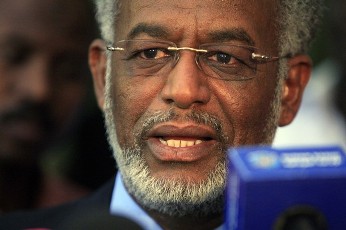Sudan rejected offer by Iran to build missile defence platforms: FM
November 3, 2013 (KHARTOUM) – The Sudanese foreign minister, Ali Ahmed Karti, has disclosed that Khartoum rejected an Iranian offer to build missile defence platforms that would enable the East African nation to stop potential Israeli attacks as have occurred in the past.

In October of last year, Sudan accused Israel of conducting an airstrike on al-Yarmouk military complex in the capital Khartoum. However, the Jewish state, which sees the East African Muslim country as an ally of its top enemy Iran and a conduit of arms smuggling to the Hamas-controlled Gaza strip, has neither confirmed nor denied the reports.
In an interview with al-Youm al-Tali daily newspaper published on Saturday, Karti stressed that Sudan’s ties with Iran would not come at the expense of its relations with neighbouring Arab countries, pointing out that military cooperation between Sudan and Iran is not directed against any Arab country.
The foreign minister has publicly expressed his opposition to the government’s decision to allow Iranian warships to dock in Port Sudan. Tehran has since docked its navy vessels three times following last year’s agreement.
Arab Gulf states, and Saudi Arabia in particular, are understood to have been angered by the close links between Iran and Sudan.
Last August, Sudan said Saudi Arabia blocked Sudanese president Omer Hassan al-Bashir’s plane from entering its airspace as he tried to fly to Iran for the inauguration of president Hassan Rouhani.
Riyadh said that Khartoum failed to obtain flight clearance in advance, denying the move was politically motivated.
In a separate matter, Karti denied that Sudan had refused to allow a planned visit by US special envoy for Sudan and South Sudan Donald Booth, blaming those who arranged the trip for its inappropriate timing.
“We do not make requests for meeting western officials on Saturdays or Sundays, so why is Sudan being asked to meet foreign officials on Saturday?” he said.
Meanwhile, Sudan’s ruling National Congress Party (NCP) has described the US administration’s decision to renew sanctions on Sudan as “unfair”, stressing that relations with the US are indispensible as it is the most influential country in the world.
The White House on Wednesday published a message on its website from president Barack Obama notifying the US congress of his decision to continue the application of the sanctions imposed on Sudan since1997.
The NCP political secretary in Khartoum state, Omer Basan, subsequently announced that the foreign ministry has embarked on a review of relations with the US.
In press statements on Sunday, he said that despite promises from Washington to normalise relations, the US continued to impose conditions which hindered the process, describing the unilateral sanctions as a “political stand”.
Washington imposed economic and trade sanctions on Sudan in 1997 in response to its alleged connection to terror networks and human rights abuses. In 2007, it strengthened the embargo, citing abuses in Darfur which it labelled as genocide.
In 2010, however, the US announced it was easing sanctions on agriculture equipment and services, allowing half a dozen companies to obtain export licenses.
Sudan has also been on the US list of states that sponsor terrorism since 1993 even though the two countries have strengthened their counter-terrorism cooperation since the September 2001 attacks on Washington and New York.
(ST)
